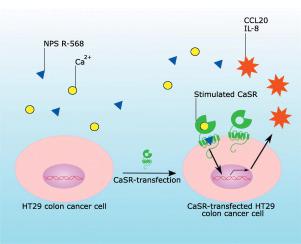Biochimica et Biophysica Acta (BBA) - Molecular Cell Research ( IF 4.6 ) Pub Date : 2020-08-27 , DOI: 10.1016/j.bbamcr.2020.118836 Luca Iamartino 1 , Taha Elajnaf 1 , Katharina Gall 1 , Jacquelina David 1 , Teresa Manhardt 1 , Petra Heffeter 2 , Michael Grusch 2 , Sophia Derdak 3 , Sabina Baumgartner-Parzer 4 , Martin Schepelmann 1 , Enikö Kallay 1

|
The calcium-sensing receptor (CaSR) is a ubiquitously expressed multifunctional G protein-coupled receptor. Several studies reported that the CaSR plays an anti-inflammatory and anti-tumorigenic role in the intestine, and that it is down-regulated during colorectal carcinogenesis. We hypothesized that positive allosteric CaSR modulators (type II calcimimetics) selectively targeting the intestinal cells could be used for the treatment of intestinal pathologies. Therefore, the aim of this study was to determine the effect of pharmacological stimulation of CaSR on gene expression in vitro and on tumor growth in vivo.
We stably transduced two colon cancer cell lines (HT29 and Caco2) with lentiviral vectors containing either the CaSR fused to GFP or GFP only. Using RNA sequencing, RT-qPCR experiments and ELISA, we determined that CaSR over-expression itself had generally little effect on gene expression in these cells. However, treatment with 1 μM of the calcimimetic NPS R-568 increased the expression of pro-inflammatory factors such as IL-23α and IL-8 and reduced the transcription of various differentiation markers in the cells over-expressing the CaSR. In vivo, neither the presence of the CaSR nor p.o. treatment of the animals with the calcimimetic cinacalcet affected tumor growth, tumor cell proliferation or tumor vascularization of murine HT29 xenografts.
In summary, CaSR stimulation in CaSR over-expressing cells enhanced the expression of inflammatory markers in vitro, but was not able to repress colorectal cancer tumorigenicity in vivo. These findings suggest potential pro-inflammatory effects of the CaSR and type II calcimimetics in the intestine.
中文翻译:

药理学拟钙剂对过度表达人钙敏感受体的结直肠癌细胞的影响。
钙敏感受体 (CaSR) 是一种普遍表达的多功能 G 蛋白偶联受体。几项研究报道,CaSR 在肠道中发挥抗炎和抗肿瘤作用,并且在结直肠癌发生过程中下调。我们假设选择性靶向肠道细胞的正变构 CaSR 调节剂(II 型拟钙剂)可用于治疗肠道病变。因此,本研究的目的是确定药物刺激 CaSR 对体外基因表达和体内肿瘤生长的影响。
我们用包含与 GFP 融合的CaSR或仅包含 GFP 的慢病毒载体稳定转导了两种结肠癌细胞系(HT29 和 Caco2) 。使用 RNA 测序、RT-qPCR 实验和 ELISA,我们确定 CaSR 过表达本身通常对这些细胞中的基因表达几乎没有影响。然而,用 1 μM 拟钙剂 NPS R-568 处理会增加促炎因子(如 IL-23α 和 IL-8)的表达,并减少过表达 CaSR 的细胞中各种分化标志物的转录。在体内,既不存在CaSR也不存在po。用拟钙剂西那卡塞治疗动物会影响小鼠 HT29 异种移植物的肿瘤生长、肿瘤细胞增殖或肿瘤血管形成。
总之,CaSR 过表达细胞中的 CaSR 刺激增强了体外炎症标志物的表达,但无法抑制体内结直肠癌的致瘤性。这些发现表明 CaSR 和 II 型拟钙剂在肠道中具有潜在的促炎作用。











































 京公网安备 11010802027423号
京公网安备 11010802027423号